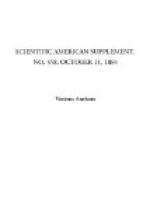Hardly had I learned of this method of medication, when I hastened to induce some proprietors in the Roman Campagna to try it with their farm hands; and, after witnessing the good results there, I endeavored to persuade practitioners to make a trial of the same treatment. I was ridiculed a little at first, for they thought it rather singular that a professor should be trying to popularize on old woman’s remedy. In reply to that I answered that practical medicine would not have existed, had it not known how to treasure up from age to age the facts of popular experience; and I ventured to remark that, had the Countess de Chinchon waited until methodical researches had been made into the physiological action of cinchona bark, before popularizing the remedy, the use of which she had learned from the semi-barbarous Peruvians, in all probability humanity would still, as regards malaria, be dependent upon the medication practiced in the middle ages. Happily these arguments had the desired effect upon certain distinguished practitioners, some of whom, especially in Sicily and Tuscany, have already collected together a tolerably large number of very encouraging observations. One of them, Dr. Mascagni, of Avezzo, tried the remedy in his own person, and succeeded in promptly curing an obstinate malarial fever which had resisted the action of quinine.
Gentlemen, in dealing with malaria we ought always to hold popular experience in high esteem, for we owe much to it. We owe to it the fact that we have been liberated from the paludal idea, and furthermore, that we have learned that it is often better, instead of trying to prevent the importation, for the most part imaginary, of malaria from distant marshes, to suppress its production in the soil under our feet or in that immediately surrounding us. We owe to it the knowledge, which we now have, that malaria rises up into the atmosphere only to a limited height, so that by placing ourselves a little above this limit in order to eliminate the possibility of the malaria being carried up to us by oblique atmospheric currents, we are enabled to breathe an air which does not contain this ferment, or which contains it only in insignificant amounts; thus one may even sleep in the open air during the night in very unhealthy districts without running any risks. The knowledge of this fact has led some peoples of Greece, and the inhabitants of the Pontine Marshes, to sleep in the open air on platforms raised on poles four or five meters (twelve to fifteen




